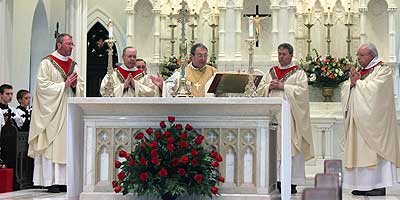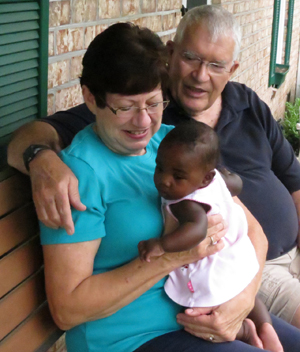WASHINGTON—The church’s teaching on artificial contraception and the role of procreation in marriage isn’t about difficult-to-follow rules in the eyes of Alice Heinzen, a veteran of marriage and family ministry in the Diocese of La Crosse, Wisconsin.
Heinzen told Catholic News Service, the long-held teaching found in Blessed Paul VI’s 1968 encyclical, “Humanae Vitae” (“Of Human Life”), is about understanding the beauty of family as created by God.
Heinzen, director of the diocese’s Office for Marriage and Family, said the document forms the foundation for St. John Paul II’s “theology of the body” and is a cornerstone of Pope Francis’ call to accompany people in their faith journey as they experience the mystery of God.
In La Crosse, the diocese has made natural family planning classes a mandatory part of its marriage preparation program. Heinzen called it a natural development that flowed from the encyclical and St. John Paul’s teaching.
Theology of the body is based on a series of 129 talks the pope gave during the first five years of his pontificate. The talks shed light on the human body and the sexual relationship and, supporters say, open up people to Christ’s invitation to life-giving love.
Natural family planning involves the monitoring by a married couple of the various biological signs indicating a woman’s time of fertility and infertility. It can be used both to avoid pregnancy or to aid in becoming pregnant.
Blessed Paul in “Humane Vitae” said that the only licit means of regulating birth is natural family planning. In the document he asked scientists to improve natural family planning methods “providing a sufficiently secure basis for a regulation of birth founded on the observance of natural rhythms.” In the past 50 years there has been an explosion of research into methods of natural family planning.
The La Crosse program focuses on why the church teaches what it teaches when it comes to artificial contraception rather than focusing on strict instructions on what the church requires, Heinzen explained.
Responding in follow-up questionnaires, couples, she said, have come to see the value of the teaching even if they delay or decide never to incorporate natural family planning practices into their lives.
“It’s the accompaniment we are providing. Even if they say this (NFP) is ridiculous in an age of technology, we realize it’s a person that has yet to open their eyes to the beauty of the teaching. We pose questions for them to consider. We gently, charitably challenge,” said Heinzen, who with her husband Jeff, were auditors for the extraordinary Synod of Bishops on the family in 2014.
For years though, diocesan and parish marriage and family ministry programs have been stressing that Blessed Paul’s message upholding the church’s long-standing prohibition on artificial birth control can be meaningful for couples and help them become closer to God.
The challenge facing the church is that the encyclical itself is rarely addressed by priests and as a result is little known, especially among young adults.
While NFP classes are mandatory in only a dozen dioceses, it is taught just about everywhere.
Dominic Lombardi, executive director of the Secretariat of Laity, Marriage, Family Life and Youth at the U.S. Conference of Catholic Bishops, knows it’s difficult to share a message that few have heard, especially one that diverges from the values of mainstream culture.
That makes the encyclical an important document for the life of the church even if it gets scant attention from the pulpit, he said.
Marriage preparation programs offer a good place to “sow a seed” with young engaged couples, he said, adding that married couples living the teaching can be the inspiration for others.
“Then the church should accompany couples and this witness for married life. You could say these couples who have lived out the freedom of ‘Humanae Vitae,’ they really are missionary couples,” Lombardi said.
Father Tadeusz Pacholczyk, director of education at the National Catholic Bioethics Center, said that parish-based programs to share church teaching on marriage and artificial contraception will have the longest-standing impact. He urged priests to begin to address the teaching more often.
“I understand the challenge some priests feel in terms of speaking about this publicly,” Father Pacholczyk told CNS. “But I will often encourage priests to at least mention the teaching. There’s certainly places where it certainly should be part of the discussion as part of marriage programs.”
In La Crosse, Heinzen said the church would do well to embrace the call of Pope Francis to approach the margins of society to share God’s love rather than to offer up strict mandates.
“Be with them and figure out who they are,” she said, referring to young couples.
“And when you do, you see the key you need to put in their lock. It takes a lot more time, but the fruit is so much better.”
By Dennis Sadowski / Catholic News Service
CNS photo/Tyler Orsburn: A family is seen on their farm in St. Leo, Kansas, in this 2013 file photo.



